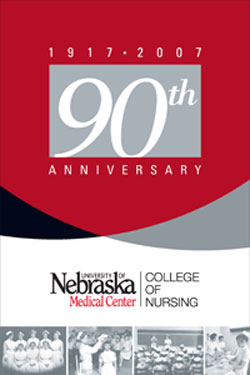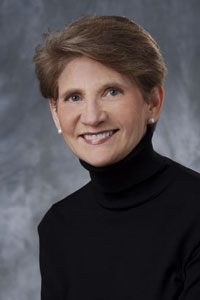 EDITOR’S NOTE: The following is a story from the spring 2007 edition of the College of Nursing publication, Advances. This and other stories from the publication will run in UNMC Today in commemoration of the college’s 90th anniversary. Click here to see the entire Advances newsletter online.
EDITOR’S NOTE: The following is a story from the spring 2007 edition of the College of Nursing publication, Advances. This and other stories from the publication will run in UNMC Today in commemoration of the college’s 90th anniversary. Click here to see the entire Advances newsletter online.
In 1917, 13 students became the founding class of a new school of nursing in Omaha.
Over the years, the school would endure many trials and eventually evolve into the UNMC College of Nursing. Today, 90 years later, the college is home to one of the top-ranked nursing programs in the country.
Across a 500-mile, statewide campus, the College of Nursing is now the largest school in the UNMC system and the largest nursing school in Nebraska, with an enrollment of more than 1,000 students in its Omaha, Lincoln, Kearney and Scottsbluff divisions.
Six deans have led the College since 1917. This is the second in a series of three stories featuring the most recent deans as they share their reflections on the occasion of the college’s 90th Anniversary.
Today, we look back with Virginia Tilden, D.N. Sc., who has served as dean since 2003.
Dr. Tilden arrived on a glorious autumn day in the fall of 2003 to take the helm as the sixth dean of the college. She had served for many years as associate dean for research at Oregon Health & Science University School of Nursing, a national leader in nursing education and nursing research. She helped drive the school’s phenomenal growth in research, rising to eighth in the country in NIH dollars.
 |
Virginia “Ginny” Tilden, D.N.Sc. |
Dr. Tilden brought new ideas to build on the college’s solid foundation. A major innovation was the Faculty Role Differentiation Plan, in which faculty take an intensive role in their area of emphasis.
“The goal is to enable faculty to identify their passion and pursue it through one of our missions,” Dr. Tilden said. “We have a tremendously dedicated faculty who are committed to excellence. While all of us teach and serve on committees of the college and university, our scholarship goals can be different depending on individual expertise and interests. Collectively, we cover all of the missions of the college. But, individually, we dedicate our scholarship to research or teaching or practice. In this way, each of us leads from our strength and from what we love to do.”
Another top priority for Dr. Tilden focused on the college’s clinical nursing centers.
These already existed, but there was no unifying structure to assist them. With a large estate gift from a grateful patient, Dr. Tilden opened the Morehead Center for Nursing Practice to provide coordination and support services. The donor gift was large enough to also create the Kenneth E. Morehead Endowed Chair in Nursing. In keeping with the gratitude expressed by Mr. Morehead for the excellent nursing care he received, this chair is dedicated to clinical nursing research that improves patients’ lives.
Innovative education programs are another high priority for this dean. During her tenure, the college has seen the opening of its Accelerated BSN program, its Fast-Track BSN to Ph.D. program, and its postdoctoral research training program.
“The time is right in the country for such programs,” Dr. Tilden said. “With the nursing shortage compounded by the looming faculty shortage, society needs nimble and creative education programs that can be adapted as needed in response to the fast pace of society today. We also want to be competitive for the best faculty in the country, and having a postdoctoral research training program here will be a major boost in faculty recruitment.”
A national academic trend embraced by Dr. Tilden is interprofessional education.
“I am pleased to have linked arms with my fellow UNMC deans to address the Institute of Medicine’s blueprint for quality healthcare,” she said. “One element is to have students from different disciplines train together on those aspects of patient care where we all come together — for example, in managing chronic illnesses.”
UNMC is incorporating inter-professional education into its strategic plan.
With her strong background in health policy, Dr. Tilden has been a powerful advocate for nursing and the college with legislators at the state and national levels.
U.S. Sen. Chuck Hagel appointed her as the only nurse on a 15-member commission formed to advise him on national health care reform.
The author of more than 90 publications and book chapters, Dr. Tilden has maintained an active program of research on improving care of the dying with almost continuous funding since the mid-1980s.
“I love being a dean, but what really lights my creative fires is nursing research,” she said. “This college is a wonderful place for scholarship in all the areas where academic nursing impacts society: teaching, research and practice.
“In the past century, essentially the history of the College of Nursing, human lifespan increased more than in the previous nine centuries combined. In 1900, average lifespan was 47 years; today, it’s 78. We’ve seen exponential advances in medical and nursing science. We’ve also faced exponential new challenges — AIDS, avian flu, bioterrorism, obesity and geriatric care being merely a few. Nursing is the frontline of health. Nurses are the face of patient care. These remain our imperatives as the College of Nursing celebrates its 90th Anniversary and embraces the 21st century.”